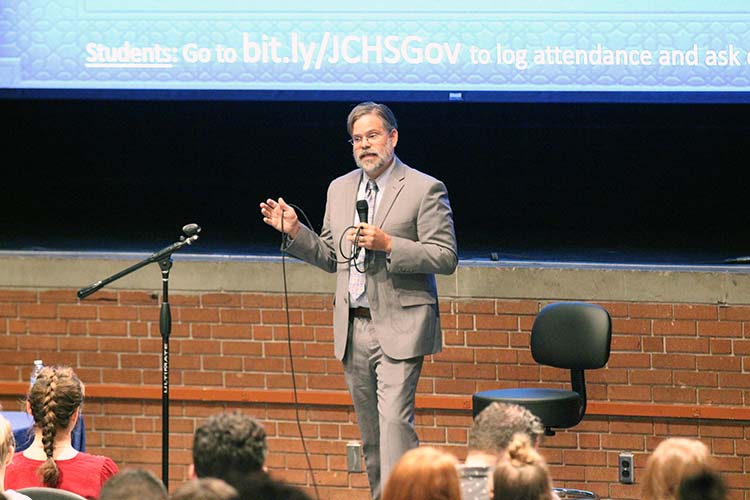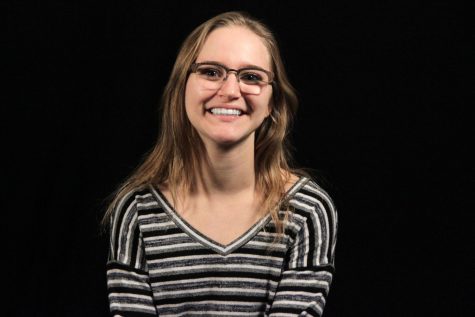Two Prominent Kansas Judges Visit Seniors
Supreme Court Judge Caleb Stegall speaks to the seniors of JCHS about his duties.
October 3, 2018
Two prominent Kansas Judges visited Junction City High School to discuss the judicial branch and the roles of the court in Kansas on September 24th, 2018 in Settles Auditorium.
Supreme Court Justice Caleb Stegall and District Court Judge John Bosch spoke to seniors enrolled in Government to discuss what it is they do in court and to answer student questions. All of the seniors enrolled in U.S. Government were expected to attend the meeting. These students had been preparing, whether knowingly or not, for this meeting for weeks as they learned about the inner workings of politics and laws during their class time.
Every year the Kansas Supreme Court travels around the state of Kansas and holds public hearings of appeal cases. Stegall explained that the reason the court does this is to promote active engagement from the Kansas citizens. By traveling from city to city they are able to increase the access that the average person has to listen to appeals cases that are occurring and help them generate a better understanding of what the state supreme court does compared to the federal supreme court.
The students in attendance asked many questions ranging from the steps to becoming a state judge, their ability to dictate federal law, and how to become active participants in their government and democracy.
Jace Goheen asked John Bosch about his path to becoming a judge.
“I went to K-State and majored in political science, I knew that I wanted to go to law school,” said Bosch. “[…] I got into law school, went to KU, and the nice thing about law school is that you can get into law school with any degree. […] There are so many things you can do with a law degree… you can always use it even if you do not practice it,” Bosch said.
Judge Caleb Stegall emphasized the importance of becoming an active participant in the local and state government as this is “an opportunity and a privilege” that not many people around the world have.
Senior Calen Boller asked how students can get involved in their local and state government to make a difference.
“A big way is to meet your local officials,” said Stegall who suggested calling your local and state representatives. “Or any of your state officials. There are advocacy groups, there are political campaigns. All of this requires you to take the first step.”
“When I was in college I interned in Washington D.C. and that was a great experience,” added Judge Bosch. “I think when you go to college there are lots of different organizations you can get involved with. I got involved with people that I am still friends with today. It all starts in high school in your own student government. The number one way to get involved is to vote. Getting involved is very rewarding though sometimes frustrating- there are lots of opportunities.”
Questions then shifted away from civic engagement and involvement and focused more on the rule of law and the duties of the two judges specifically.
Janelle Thornton asked how laws can be used to address issues of illegal immigration.
While Stegall was unable to answer as it was outside of his court’s jurisdiction, Bosch took the liberty of explaining how he deals with such cases and the issues they pose.
“Frequently we see undocumented individuals in court […] I have divorce cases, I have criminal cases, and I have Child Need of Care cases, and this poses a big issue because our courts are accessible to everyone and there is a big debate over whether they should be or they shouldn’t be- but they are,” Bosch said.
Bosch argued that the issue with illegal immigrants in many cases is the opposing party arguing that the immigrant has no rights at all, and therefore should not be tried as if they do.
Makayla Powell asked if either judge had ever made a mistake when giving a sentence, and if so, what they had done to fix it.
“One of the things that district judges can’t do once they sentence somebody, is change their mind,” explained Bosch. “If you made an illegal sentence you can always correct it, but it has to be illegal. If it is a matter of judgment, it’s done. Then you have to go to the court of appeals and hope they correct you.”
The State Supreme Court, Stegall explained, has the responsibility of only hearing appeal cases. These are cases that have gone through trial in a local court and the offender feels as though they were not granted a fair trial and thus attempts to have their ruling overturned.





 Did YOU solve this problem, #JCHS?
Did YOU solve this problem, #JCHS?


 Are you going to learn a new language, #JC
Are you going to learn a new language, #JC


 INTO THE WOODS, a dramatic comedy spinning
INTO THE WOODS, a dramatic comedy spinning








 Tomorr
Tomorr


 - The Ja
- The Ja


 from Senior Night
from Senior Night  - HUGE
- HUGE 




